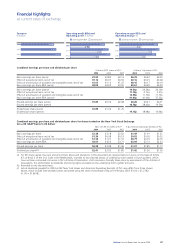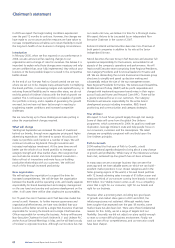Unilever 2004 Annual Report Download - page 19
Download and view the complete annual report
Please find page 19 of the 2004 Unilever annual report below. You can navigate through the pages in the report by either clicking on the pages listed below, or by using the keyword search tool below to find specific information within the annual report.16 Unilever Annual Report and Accounts 2004
About Unilever
(continued)
Intellectual property
We have a large portfolio of patents and trademarks, and we
conduct some of our operations under licences which are based
on patents or trademarks owned or controlled by others. We are
not dependent on any one patent or group of patents. We use
our best efforts to protect our brands and technology.
Description of our properties
We have interests in properties in most of the countries where
there are Unilever operations. However, none is material in the
context of the Group as a whole. The properties are used
predominantly to house production and distribution activities
and as offices. There is a mixture of leased and owned property
throughout the Group. There are no environmental issues
affecting the properties which would have a material impact
upon the Group, and there are no material encumbrances on our
properties. Any difference between the market value of properties
held by the Group and the amount at which they are included in
the balance sheet is not significant. See the schedule of principal
group companies and fixed investments on page 165 to 168 and
details of tangible fixed assets in note 10 on page 114.
We currently have no plans to construct new facilities or expand
or improve our current facilities in a manner that is material to the
Group.
Legal and arbitration proceedings and regulatory matters
We are not involved in any legal or arbitration proceedings and
do not have any obligations under environmental legislation
which we expect to lead to material loss or expenditure in the
context of the Group results. None of our Directors or Officers are
involved in any such material legal proceedings.
In 1999 NV issued €0.05 preference shares as an alternative to a
cash dividend. In March 2004 NV announced its intention to
convert those preference shares into ordinary NV shares in the
first quarter of 2005. A number of holders of these preference
shares raised objections to this and asked the Enterprise Chamber
of the Amsterdam Court of Appeal to conduct an inquiry. On
21 December 2004 the Enterprise Chamber decided to order an
inquiry to be carried out. As at 25 February 2005, this inquiry is
ongoing. An additional request to forbid the conversion was
rejected by the Enterprise Chamber. Further information is given
in note 22 on page 132.
Unilever has businesses in many countries and from time to
time these are subject to investigation by competition and other
regulatory authorities. One such matter concerns ice cream
distribution in Europe, notably the issues of outlet and cabinet
exclusivity. In October 2003, the Court of First Instance in
Luxembourg ruled in favour of the European Commission’s
decision banning Unilever’s Irish ice cream business, HB Ice
Cream, from seeking freezer cabinet exclusivity for their products
in the Irish market. HB Ice Cream has submitted an appeal against
the decision of the Court of First Instance in Luxembourg. If
unsuccessful, then freezer exclusivity in Ireland will be
unenforceable in outlets which only have HB freezers. Similar
consequences may apply in specific European markets with
equivalent structures to those described in the decision.
During 2004 the Federal Supreme Court in Brazil (local acronym
STF) announced a review of certain cases that it had previously
decided in favour of taxpayers. As a result of this action we have
established a provision of €169 million for the potential
repayment of sales tax credits in the event that the cases
establishing precedents in our favour are reversed.
Also in Brazil, and in common with many other businesses
operating in that country, one of our Brazilian subsidiaries
received a notice of infringement from the Federal Revenue
Service. The notice alleges that a 2001 reorganisation of our local
corporate structure was undertaken without valid business
purpose. If upheld, the notice could result in a significant tax
claim in respect of prior years. The 2001 reorganisation was
comparable to that used by many companies in Brazil and we
believe that the likelihood of a successful challenge by the tax
authorities is remote. This view is supported by the opinion of
outside counsel.
Government regulation
Unilever businesses are governed, in particular, by laws and
regulations designed to ensure that their products may be safely
used for their intended purpose and that their labelling and
advertising are truthful and not misleading. Unilever businesses
are further regulated by data protection and anti-trust legislation.
Important regulatory bodies in respect of our businesses include
the European Commission and the US Food and Drug
Administration.
We have processes in place to ensure that products, ingredients,
manufacturing processes, marketing materials and activities
comply with the above-mentioned laws and regulations.
























